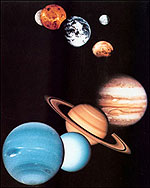The search for life: Astrobiology
By Monica Grady
Introduction

The planets © NASA / JPL / Caltech
The question of whether we are alone in our universe has fascinated humanity since the earliest of times. Stories of mysterious beings from the sky permeate the mythology of many cultures and make a regular appearance in fiction, while the number of UFO sightings continues to rise. Yet aside from the myths and sensationalism, the study of astrobiology--the search for life elsewhere in the universe--has become widely accepted as a valid and important area of research. Astrobiology encompasses cosmology, astrophysics, planetary science, palaeontology, chemistry, biochemistry, biology, genetics and anthropology. Monica Grady, Professor of Planetary and Space Science at the Open University, presents a comprehensive introduction to astrobiology.
This course starts at the very beginning with the Big Bang, when the universe was formed. Dr Grady explores our own planet with a look at how life first came about and the range of environments in which it has adapted to survive. Studying organisms that live in the most extreme and inhospitable habitats provides a guide to the limits of life on other planets. Dr Grady moves on to explore places in our solar system where life might be found, before heading out into space to examine the possibilities for life in our galaxy and beyond.
Topics
About the author
Monica Grady is Professor of Planetary and Space Science at the Open University and former head of the petrology and meteoritics division in the Department of Mineralogy at the Natural History Museum. Dr Grady received an honours degree in chemistry and geology from the University of Durham in 1979, then went on to complete a PhD on carbon in stony meteorites at the University of Cambridge in 1982. Since then Monica has continued to specialise in the study of meteorites, and carried out this research at Cambridge, then the Open University, prior to joining the Natural History Museum in 1991. Her particular research interests are in carbon and nitrogen stable isotope geochemistry of Martian meteorites and micrometeorites, and in astrobiology and the possibilities of life elsewhere in the cosmos. Asteroid (4731) was named Monicagrady in her honour.